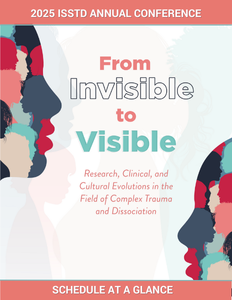Back
Posters
Poster Judging Hour
I No Longer Remember What it Feels Like to be Me: Experiences of Identity in Waking and Dreaming Life in People with Depersonalisation-Derealisation Disorder
Friday, March 14, 2025
6:00 PM – 7:00 PM US Eastern Time

Rebecca Shashoua (she/her/hers)
Trainee Clinical Psychologist (final year)
NHS England and University of Essex , United Kingdom
Abstract
Depersonalisation-Derealisation Disorder (DPDR) is a dissociative condition characterised by persistent, distressing feelings of detachment from oneself or the external world (Yang et al., 2022). Despite growing recognition of theprofound disruptions to the sense of identity in people with DPDR, existing research largely relies on quantitative methods to understand DPDR symptomology, leaving significant gaps in our understanding of the subjective, livedexperiences of those affected. Limited qualitative studies have explored DPDR experiences more broadly, rather than specifically examining the construct of identity. This study addresses this gap, making it the first to qualitatively explore how individuals with DPDR experience their sense of identitywhen awake and in their dreams.
Twelve in-depth interviews were conducted using thepsychoanalytically-informed free-association narrative interview method with individuals diagnosed with DPDR. The interviews aimed to uncover how participants perceive and navigate their sense of identity in both waking and dreaming life, considering the potential for unique insights dreams may offer into self-perception. Using narrative analysis, the study identified three overarching narrative types in participants’ stories, each with two subthemes: narratives of constancy and change across time (‘Loss of pre-DPDR self and attempts to reconcile with the present’ and ‘Similarity between pre and post-DPDR sense of self), Intersubjectivity (‘Faking a sense of self and doing what is expected’ and ‘Interpersonal situations which strengthen or weaken sense of self’,and Agency (‘Taking control vs feeling powerless’ and ‘Waking life as scary and dreams as a safe space to regain agency’).
This study contributes to narrative theory and theories of identity and dreams, as well as the literature on livedexperiences of DPDR. The implications for clinical practice suggest therapeutic approaches could benefit from addressing identity-related concerns and incorporating the interplay between waking and dreaming experiences. Overall, this research provides a foundation for a holistic, person-centered approach to understanding and treating DPDR outside of the dominant trauma-focussed narrative.
Depersonalisation-Derealisation Disorder (DPDR) is a dissociative condition characterised by persistent, distressing feelings of detachment from oneself or the external world (Yang et al., 2022). Despite growing recognition of theprofound disruptions to the sense of identity in people with DPDR, existing research largely relies on quantitative methods to understand DPDR symptomology, leaving significant gaps in our understanding of the subjective, livedexperiences of those affected. Limited qualitative studies have explored DPDR experiences more broadly, rather than specifically examining the construct of identity. This study addresses this gap, making it the first to qualitatively explore how individuals with DPDR experience their sense of identitywhen awake and in their dreams.
Twelve in-depth interviews were conducted using thepsychoanalytically-informed free-association narrative interview method with individuals diagnosed with DPDR. The interviews aimed to uncover how participants perceive and navigate their sense of identity in both waking and dreaming life, considering the potential for unique insights dreams may offer into self-perception. Using narrative analysis, the study identified three overarching narrative types in participants’ stories, each with two subthemes: narratives of constancy and change across time (‘Loss of pre-DPDR self and attempts to reconcile with the present’ and ‘Similarity between pre and post-DPDR sense of self), Intersubjectivity (‘Faking a sense of self and doing what is expected’ and ‘Interpersonal situations which strengthen or weaken sense of self’,and Agency (‘Taking control vs feeling powerless’ and ‘Waking life as scary and dreams as a safe space to regain agency’).
This study contributes to narrative theory and theories of identity and dreams, as well as the literature on livedexperiences of DPDR. The implications for clinical practice suggest therapeutic approaches could benefit from addressing identity-related concerns and incorporating the interplay between waking and dreaming experiences. Overall, this research provides a foundation for a holistic, person-centered approach to understanding and treating DPDR outside of the dominant trauma-focussed narrative.

